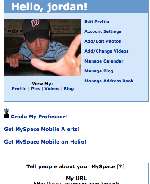
Politicians hitting the campaign trail might show up on a computer near you. With the mid-term elections right around the corner, politicians looking to grab the youth demographic are increasingly turning to Myspace and Facebook to reach voters under the age of 30.
Profiles of the candidates vary, but many politicians using these Web sites post their main campaign platform, as well as some personal facts to please their audience. Some profiles even include videos of their campaign advertisements. Since these Web sites are free for users, politicians are eager to explore the potential of reaching vast amount of voters without spending any money. Many campaign groups even reported an increase in donations, and they hope this will result in higher turnouts at the polls.
When searching for candidates' profiles, you might come across some that might not exactly be "official." President Bush, who appears to be great friends with Chuck Norris, Hillary Clinton, who looks forward to meeting Paris Hitlon and Vice President Cheney, who's favorite movie is Mrs. Doubtfire, might not give these profiles their seal of approval. If you'll notice, the first two seem to be listed as "friends." Funny, I didn't know they got along. Anyway, there are real profiles from several high profile candidates such as Howard Dean and John Edwards. The important thing is to realize their are a lot of imposter profiles mixed in with the real deal. Luckily, most of the time it is fairly easy to distinguish if it's authentic or not.
There are several drawbacks to having a Myspace and Facebook profile. Once a person is listed as a friend, he or she has access to post comments on the profile page. Obviously, these comments might not always be positive, so candidates run the risk negative views being posted on their profile for all to see. However, nearly all candidates take this in stride. Several politicians even took the situation as an opportunity to post a comment of their own as a way to discredit these remarks and strengthen their own platform.
Realizing the vast potential of driving the usually absent younger voters to the polls, Myspace launched a new initiative called "Declare Yourself" to allow people to easily register to vote. This might pave the way for more younger voters to enter the voting booths, but getting young voters involved has continually been a challenge for politicians. Time will tell if Myspace and Facebook are effective ways to reach young voters. There is one positive regardless of the results: at least politicians have more friends.


COMMENTS